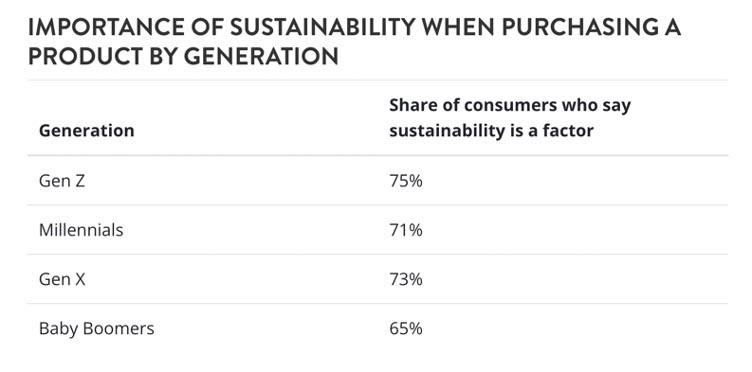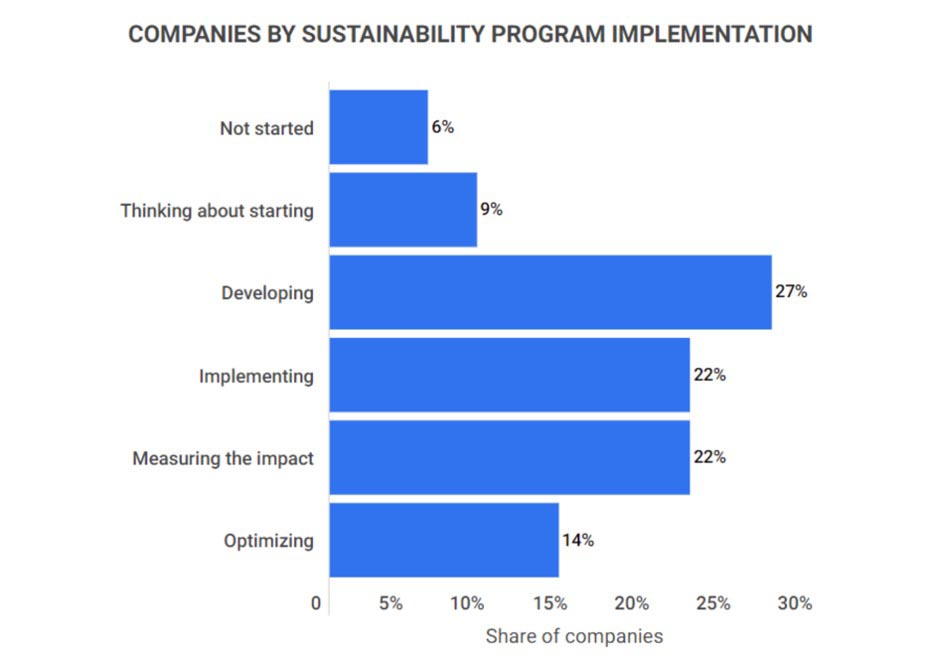We all know how important sustainability has become. In fact, according to McKinsey, products making environmental, social, and governance claims averaged 28% cumulative growth over the five-year study period compared to 20% for products that made no such claims. Furthermore, according to Neilsen, between 71% and 75% of Gen X, Millennials, and Gen Zs say that sustainability is a factor in their purchasing decisions. Even 65% of Baby Boomers say the same.

Source: Zippia
With so much impact on shopping behavior, it’s no wonder it’s so tempting for brands to inflate their environmental claims. Making environmental claims without being able to back them up is called “greenwashing,” and it’s more common than we might think.
According to stats compiled by Zippia, a “staggering” 72% of North American and 58% of global companies admit to greenwashing. More than four in 10 (43%) of employees believe their company is doing it, too.
“85% of executives believe customers are becoming more vocal about sustainability, and because these companies want to please their customers, they often make exaggerated claims,” notes Zippia in its blog post “20+ Greenwashing Statistics.” “The truth is that many companies are still trying to develop sustainability plans or are not prepared to implement them.”

Source: Zippia
It’s no wonder buyers have become increasingly wary of environmental claims. Nearly nine in ten (88%) of Gen Zs say they no longer trust brands’ environment, social, and governance (ESG) claims. And why should they? Not only do companies intentionally greenwash, but many do so because backing up their claims is just plain hard.
Back in 2022, What They Think covered the efforts of Prime Data to document its path to fully carbon-neutral direct mail. In this two-part series, it gives a glimpse into the complexities of documenting a company’s environmental claims—and printing is among the simplest industries to track. Not only does print have relatively few components, but with paper being the largest component and the paper industry being among the most conscientious about documenting their cradle-to-grave impact, this makes the printing industry’s calculations simple by comparison to many others.
Tough or not, it’s better for companies unable to back up their claims to simply stay quiet about them. Zippia notes that companies perceived to be greenwashing suffer a 1.32% drop in customer satisfaction scores: “This drop leads to an average of 0.032 units of change in net earnings and a 0.40 change in ROI.”
There can be direct financial consequences, as well. Just consider these well-known cases:
Volkswagen (VW): VW falsely claimed that their diesel vehicles met emissions standards while using “defeat devices” to cheat emissions tests. Ultimately, VW agreed to pay over $15 billion in settlements for violating emissions regulations in the U.S. alone. Globally, the fines and settlements reached tens of billions of dollars.
Amazon: Amazon was accused of greenwashing by overstating its efforts to reduce carbon emissions and failing to disclose its full environmental impact. In 2021, Amazon was fined €746 million (approximately $880 million) by the European Union for breaching data protection laws. While this fine was not specifically related to greenwashing, it reflects the growing scrutiny of Amazon's practices.
Kinder Morgan: Kinder Morgan, a major energy infrastructure company, was fined for misleading advertising that claimed its pipeline project would have "zero impact" on the environment. Ultimately, Kinder Morgan agreed to pay a $1 million fine and remove the misleading advertising.
Walmart: Walmart faced criticism for overstating its commitment to renewable energy and sustainability in its advertising. While Walmart has not been fined specifically for greenwashing, it has faced reputational damage and legal challenges related to its environmental claims.
These cases highlight the importance of companies being transparent and truthful in their environmental claims. Greenwashing not only deceives consumers but also undermines genuine efforts to promote sustainability. As consumer awareness grows, companies must ensure that their environmental claims are backed by credible evidence and align with their actual environmental impact.
The takeaway? If you’re going to make environmental claims, back them up!















Discussion
By Patrick Whelan on Feb 21, 2024
There are very easy and effective ways for printers to combat Greenwashing. TwoSidesNA provides a ton of great content for this. All printers need to do is be proactive with sharing (including modifying) this info on their blog, social sites and newsletter. Content marketing 101. Post to website, share on social and push with email. The content is already created so the hard part is already done. TwoSides has done an incredible job.
Discussion
Join the discussion Sign In or Become a Member, doing so is simple and free